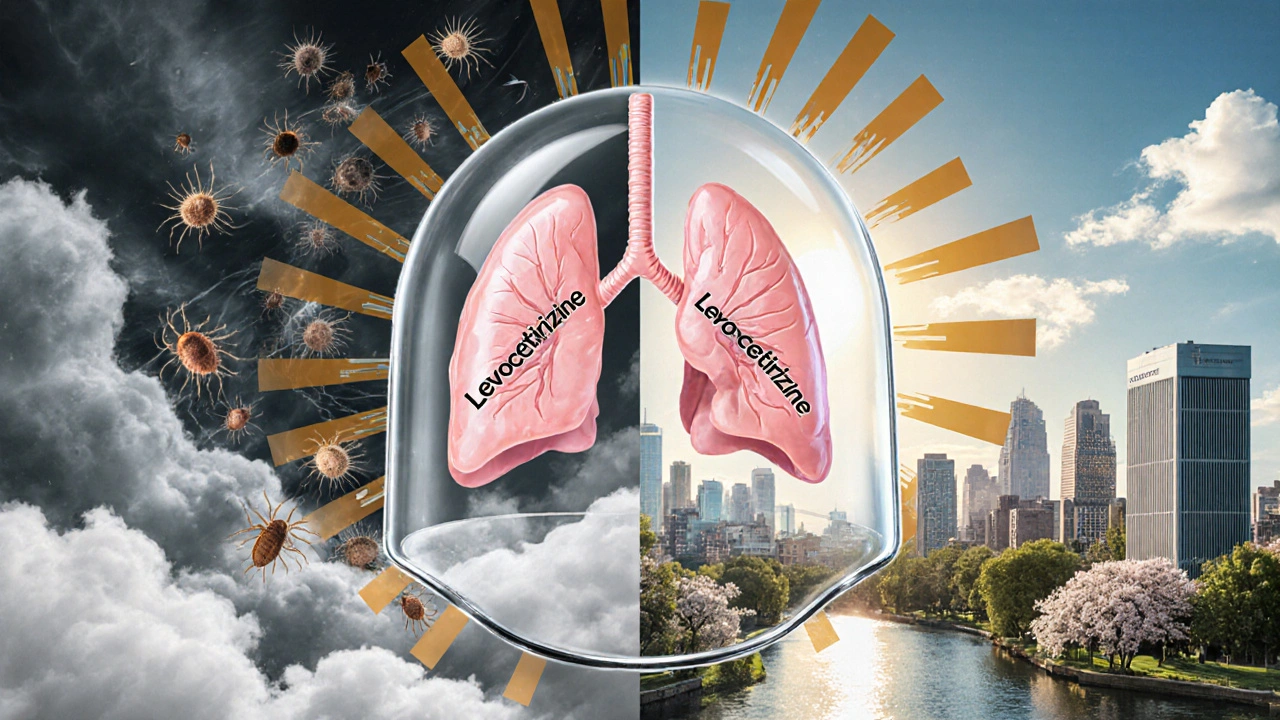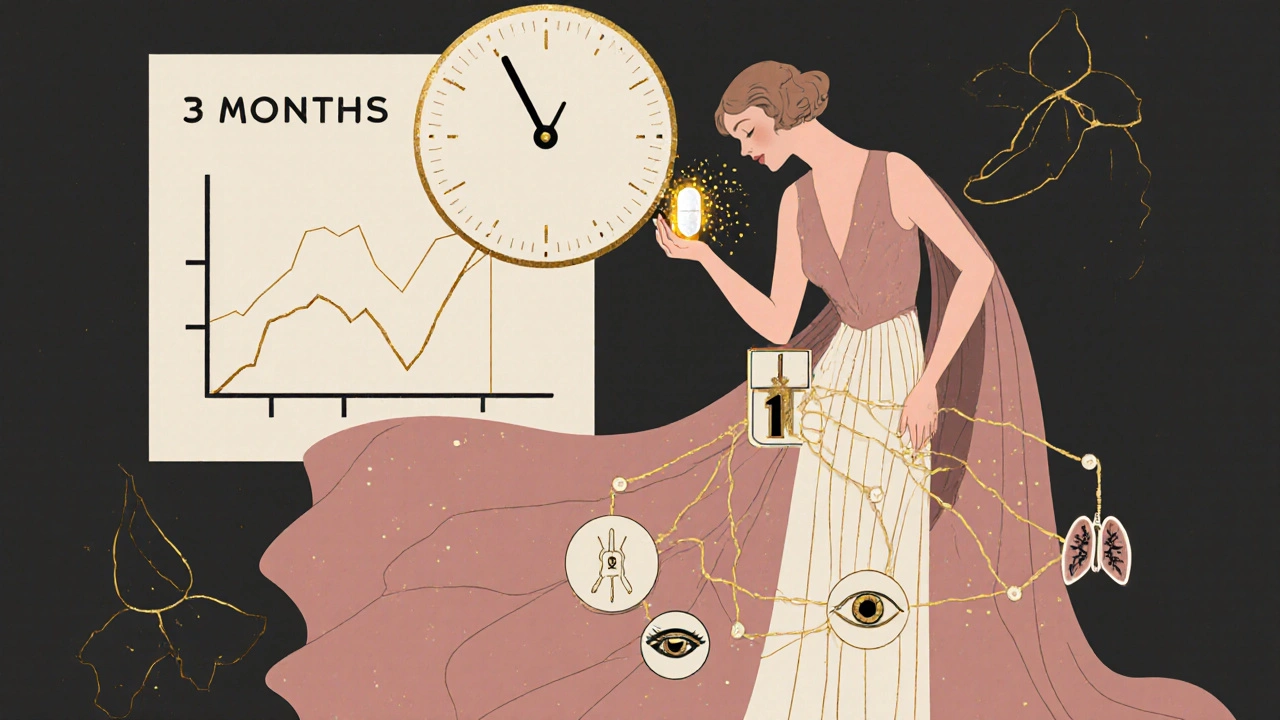Levocetirizine is a common antihistamine used for allergies-runny nose, itchy eyes, hives. But if you have asthma, especially allergic asthma, you might wonder: can this pill help with your wheezing or chest tightness? The short answer is no, it doesn’t treat asthma directly. But it can help reduce triggers that make asthma worse. That’s a big difference.
What Levocetirizine Actually Does
Levocetirizine is the active ingredient in medications like Xyzal. It blocks histamine, a chemical your body releases during allergic reactions. Histamine causes sneezing, itching, and swelling. By stopping it, levocetirizine eases allergy symptoms. It’s not a bronchodilator. It doesn’t open up your airways. It doesn’t reduce lung inflammation like inhaled steroids do. It’s designed for the nose, skin, and eyes-not the lungs.
That’s why you won’t find levocetirizine listed as an asthma treatment in guidelines from the Global Initiative for Asthma (GINA) or the American Thoracic Society. Those documents focus on inhalers, leukotriene modifiers, and biologics. Levocetirizine isn’t in that list.
How Allergies and Asthma Are Connected
Many people with asthma also have allergies. In fact, about 80% of children and 50% of adults with asthma have allergic triggers. Dust mites, pollen, pet dander, mold-these don’t just cause sneezing. They can set off asthma flare-ups. When your immune system reacts to these allergens, it releases histamine and other chemicals that can tighten the muscles around your airways. That’s when you start wheezing or coughing.
So while levocetirizine doesn’t fix asthma, it can stop the allergy part from triggering the asthma part. Think of it like turning off a light switch that turns on a fire alarm. The alarm (asthma) still needs its own system to be silenced, but if you stop the trigger (allergy), the alarm might not go off at all.
What the Studies Say
A 2019 review in the Journal of Allergy and Clinical Immunology looked at 12 clinical trials involving antihistamines and asthma control. The researchers found that antihistamines like levocetirizine didn’t improve lung function (FEV1) or reduce the need for rescue inhalers. But they did significantly reduce nasal symptoms and improved quality of life scores in people with allergic asthma.
Another study from 2021, published in Respiratory Medicine, followed 150 adults with allergic asthma over six months. Half took levocetirizine daily; the other half took a placebo. Both groups used their inhalers as needed. The levocetirizine group had fewer asthma exacerbations requiring oral steroids-about 30% fewer. But their lung function numbers didn’t change. The benefit came from fewer allergy-driven flare-ups, not better lung control.
That’s the pattern: levocetirizine helps manage the allergic side of asthma, not the asthma itself.

When It Might Be Useful
If your asthma flares up every spring when pollen counts are high, or every time your cat jumps on the bed, levocetirizine could be part of your plan. It’s most helpful when:
- Your asthma is clearly triggered by allergens (confirmed by skin or blood tests)
- You have ongoing nasal congestion or itchy eyes along with your wheezing
- You’re already using your inhaler correctly but still have frequent symptoms
Doctors sometimes add levocetirizine to a treatment plan when someone has both allergic rhinitis and asthma. This combo is called "united airway disease." Treating both parts at once often leads to better overall control.
What It Won’t Do
Don’t use levocetirizine as a substitute for your inhaler. If you’re having trouble breathing, your rescue inhaler (like albuterol) is what you need. Levocetirizine takes hours to start working and doesn’t help during an attack. It’s a daily preventive, not an emergency tool.
It also won’t help if your asthma is triggered by cold air, exercise, stress, or smoke. Those triggers don’t involve histamine, so blocking it won’t make a difference.
Side Effects and Safety
Levocetirizine is generally well-tolerated. The most common side effect is drowsiness-about 1 in 10 people feel a little sleepy, especially when they first start taking it. That’s less than older antihistamines like diphenhydramine, but it’s still something to watch for if you drive or operate machinery.
Other possible side effects include dry mouth, fatigue, or mild headache. Serious reactions are rare. It’s safe for most adults and children over 6 months old. But if you have kidney problems, your doctor may lower your dose. Always tell your doctor about other meds you’re taking-especially sedatives or antidepressants.

Alternatives and Combinations
If levocetirizine doesn’t help enough, your doctor might suggest:
- Fexofenadine (Allegra) - less likely to cause drowsiness
- Montelukast (Singulair) - blocks leukotrienes, which are involved in both allergies and asthma
- Intranasal corticosteroids - like fluticasone spray - for nasal symptoms that trigger asthma
- Allergy shots (immunotherapy) - long-term solution that changes how your body reacts to allergens
Montelukast is especially relevant here. Unlike levocetirizine, it’s approved for asthma prevention in adults and children as young as 12 months. It works on a different pathway in the immune system and can be used alongside antihistamines.
What to Do If You Have Allergic Asthma
Here’s a practical step-by-step:
- Get tested for allergies. Skin prick tests or IgE blood tests can confirm what’s triggering your asthma.
- Keep a symptom diary. Note when you wheeze, cough, or feel tight in the chest. Link it to pollen counts, pets, cleaning, or travel.
- Use your inhaler as prescribed. Don’t skip it, even if you feel fine.
- If allergies are confirmed, ask your doctor about adding levocetirizine. Take it daily, not just when symptoms appear.
- Reduce exposure. Use allergen-proof bedding, run a HEPA filter, wash pets weekly, and stay indoors on high-pollen days.
- Re-evaluate every 3 months. Does your asthma feel more stable? Are you using your rescue inhaler less?
Many people see big improvements just by controlling their allergies. One patient, 34-year-old Maria from Chicago, used to have three asthma attacks a month. After starting levocetirizine and using a HEPA filter, she had one in six months. Her inhaler use dropped by 70%. She didn’t get better because levocetirizine fixed her lungs. She got better because it stopped her allergies from setting off her asthma.
The Bottom Line
Levocetirizine won’t cure asthma. It won’t replace your inhaler. But if your asthma is tied to allergies, it can be a useful tool. It’s not a treatment for asthma-it’s a tool for managing triggers. For people with allergic asthma, controlling the allergy side of the equation often means fewer flare-ups, fewer doctor visits, and better sleep.
Always talk to your doctor before adding any new medication. They can help you decide if it fits your specific situation. And remember: asthma control isn’t about one pill. It’s about a plan-medication, triggers, and habits-all working together.
Can levocetirizine stop an asthma attack?
No. Levocetirizine does not work quickly enough to relieve an asthma attack. It takes hours to reach full effect and doesn’t open airways. For an active attack, use your rescue inhaler (like albuterol) as directed. Levocetirizine is only useful as a daily preventive for allergy-triggered symptoms.
Is levocetirizine safe for children with asthma?
Yes, levocetirizine is approved for children as young as 6 months old for allergy symptoms. For children with allergic asthma, it’s often used alongside asthma medications like inhaled corticosteroids. Always follow the pediatric dose based on weight and age. Drowsiness is possible, so monitor for changes in alertness or behavior.
Does levocetirizine interact with asthma inhalers?
No significant interactions exist between levocetirizine and common asthma inhalers like albuterol, fluticasone, or budesonide. It’s safe to take both together. In fact, many doctors recommend combining them for people with allergic asthma. Always inform your doctor about all medications you’re using.
How long does it take for levocetirizine to help with asthma symptoms?
Levocetirizine starts working within 1 hour, but its full effect on allergy-related asthma triggers may take 1 to 2 weeks of daily use. You won’t notice immediate improvement in wheezing or shortness of breath. Instead, you may see fewer flare-ups over time, especially during allergy season or after exposure to known triggers.
Should I stop taking my inhaler if I start levocetirizine?
Never stop your prescribed asthma inhaler without talking to your doctor. Levocetirizine helps reduce triggers, but it does not treat airway inflammation or bronchoconstriction. Stopping your inhaler could put you at risk for serious asthma attacks. Use levocetirizine as an addition, not a replacement.


Megan Raines
October 31, 2025 AT 01:59So it's not a cure, but it's a shield? That's actually kind of elegant when you think about it.
Mamadou Seck
November 2, 2025 AT 01:05levocetirizine dont fix asthma but it stops the allergy from starting the fire thats wild i mean why dont they just say that in the first place
Anthony Griek
November 3, 2025 AT 05:01My uncle in Texas has allergic asthma and he swears by this stuff. He takes it every night like clockwork. His inhaler usage dropped by half. Not a miracle but definitely a helper. Just dont expect it to do the work of your inhaler.
Norman Rexford
November 3, 2025 AT 17:55why are we even talking about this when we got better options like montelukast?? this is like using a spoon to dig a tunnel. america needs to upgrade its med game
Wayne Keller
November 3, 2025 AT 18:49Good breakdown. I’ve been telling my patients this for years. Allergies and asthma are like two sides of the same coin. Treat one, you help the other. But never skip the inhaler. That’s non-negotiable.
Shana Labed
November 4, 2025 AT 12:30OMG YES this is exactly what my pulmonologist said!! I was so done with coughing every time my dog sneezed 😭 now I take this daily and my nights are actually SLEEPABLE. Also my cat is now banned from the bedroom and I’m not sorry 🐱🚫
California Daughter
November 6, 2025 AT 03:20Wait… so you’re saying… if I just… take this pill… my asthma will… just… stop? No no no no no. This is too good to be true. There’s gotta be a catch. Like… maybe it causes existential dread? Or makes your socks disappear? I’m skeptical. Very skeptical. Like… overly skeptical. With extra punctuation!!!
Vishwajeet Gade
November 6, 2025 AT 08:34india has better meds for this. why are you still using american junk? we use natural herbs and yoga. no pills needed. your body is weak
Casey Crowell
November 6, 2025 AT 23:08Just had a moment of clarity 😌 this isn't about one pill - it's about listening to your body. Allergies are the sneaky trigger. Fix that, and your lungs thank you. Also, if you're on this, you're already winning. 💪✨
Shanna Talley
November 8, 2025 AT 20:56Love how this post doesn't oversell. Real talk: asthma is messy. But controlling triggers? That's power. You don't need a magic bullet. You need consistency. And maybe a HEPA filter. And maybe this pill. And maybe both. You got this.
Judy Schumacher
November 9, 2025 AT 20:13Let me be perfectly clear - this is not a breakthrough. It’s a Band-Aid on a bullet wound. The fact that we’re even discussing antihistamines as a primary adjunct for asthma speaks to a systemic failure in respiratory medicine. We have biologics that target IgE pathways, leukotriene antagonists, and monoclonal antibodies - yet the standard of care still leans on a second-generation antihistamine because it’s cheap, patent-expired, and easy to prescribe? This is not science. This is inertia wrapped in a white coat. The GINA guidelines are outdated. The FDA is asleep at the wheel. And patients are left wondering why their symptoms persist despite ‘doing everything right.’ Levocetirizine is not the problem. The problem is that we’ve normalized mediocrity in asthma management. We treat symptoms instead of systems. We optimize for convenience instead of outcomes. And then we pat ourselves on the back for reducing nasal congestion. Let’s not mistake partial relief for control. Let’s not confuse prevention with cure. And let’s stop pretending that a once-daily pill is the answer to a chronic, life-altering disease. If you’re still using albuterol more than twice a week, you’re not managing asthma - you’re surviving it. And that’s not good enough.